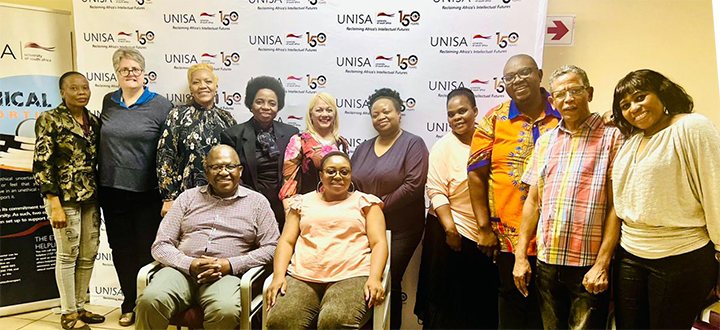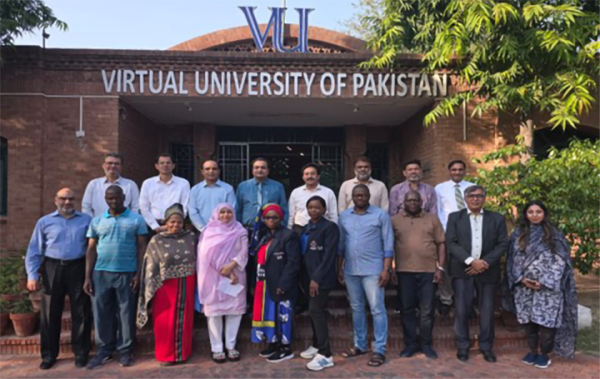News & Media
DTSFL trades its edge in Asia to the world
The Asian Association of Open Universities (AAOU) amassed the world’s best minds on open distance learning (ODL) for its 37th conference in Islamabad, Pakistan, from 15 to 17 October 2024. Intellects from 21 countries worldwide critically and earnestly discussed a multiplicity of innovations that expand the horizons of ODL. It aptly themed the conference "Expanding Horizons: Innovations in Open Distance Learning".
The linchpin that held the deliberations together was that the world is in flux and that it, undeniably, is technological. Among the currencies of its essence is AI (artificial intelligence). Thus, any force that negates the central role of AI in the current human life, particularly in carrying out any educational enterprise, is a non-starter. Situating ODL snugly within AI is sine qua non – indispensable. At issue was the continuous and symbiotic interplay between digital and pedagogic transformation that gyrate and seamlessly collapse into a force to drive student’s academic success.
The assembled best minds scholarly lensed the force through three layers: pedagogical shift, operational transformation, and student engagement and experience. The first layer points to a move towards student-centred learning, where technology supports personalised pathways; and blended learning, combining online and office methods to provide flexible, multimodal learning opportunities. The second layer speaks of automating administrative tasks like admission and student support, allowing students to focus on higher-value activities. The final layer heralds enabling the students to access resources anytime, anywhere, creating an environment of self-paced, continuous learning. AI, among other technological expressions, is chiefly the livewire that commands the drive.
Methodically, the conference produced ten resolutions:
- Use AI in open distance learning (ODL)
- Make education inclusive with blended learning
- Support Sustainable Development Goals (SDGs) with ODL
- Support students’ mental health in ODL
- Encourage research and innovations in ODL
- Use MOOCs (massive open online courses) to increase access to education
- Promote lifelong learning and professional growth
- Embrace technology to close the digital divide
- Encourage interdisciplinary learning in ODL
- Train faculty in AI and digital skills
Laced within the entire conference deliberations leading to the surgical resolutions listed lays, pre-eminently, the voice of Unisa’s Department of Tuition Support and Facilitation of Learning (DTSFL) solidly lending the African solution to the global problem at hand.

From left: Dr Rakwena Monareng (Directorate Language Services), Lekau Rachidi (Student Retention Unit), Dr Phumza Makgato-Khunou (Instructional Support and Services), Prof Meahabo Magano (Department of Tuition Support and Facilitation of Learning), Prof Itumeleng Setlhodi (Academic Quality Assurance and Enhancement) and Aaron Mabasa (Directorate Language Services)
With utmost modesty and in adherence to scientific rigour that is sturdily grounded on first-hand African and conventional world experience, the sextet constituted by Prof Meahabo Magano, Prof Itumeleng Setlhodi, Dr Phumza Makgato-Khunou, Aaron Mabasa, Lekau Rachidi and Dr Rakwena Monareng snugly captured the essence referred. They represented Unisa with distinction. The papers they presented individually are the nerve-centre for the African dimension discernible from the conference recommendation cited. They each received certificates for their contribution to the conference, with Magano and Setlhodi receiving additional certifications and the podium walk-through honour for their role as reviewers of the conference papers. It was humbling to note how South African opinion was sought from the sextet by countless conference attendees with most expressing interest to study at Unisa. DTSFL traded its edge to enliven Unisa’s institutional membership to the AAOU in earnest and successfully. It did not end here, though.
In living up to the Unisans’ commitment to responsible corporate citizenry the DTSFL sextet visited the Virtual University of Pakistan (VUP) for a tête-à-tête meant to validate the proposition it (DTSFL) made to its institutional in-house portfolio and the university for a memorandum of understanding (MOU) with this well-grounded institution.

The Department of Tuition Support and Facilitation of Learning sextet and the hosts, Virtual University of Pakistan
The physical visit and engagement with VUP at their various campuses, including its headquarters, were worth it. It compellingly solidified the conviction that a collaboration is of great value. VUP is a thoroughly homegrown, conceptualised and efficiently operating institution with a wide reach throughout the country. It generates AI solutions designed organically consonant to the educational needs and context of Pakistan. Unpretentious and modest, yet trendsetting and record-breaking, the institution has a unique business model that works. It deservedly earned the award of the Best Open University of the World in 2022. The DTSFL sextet went, observed and is in awe scholastically, hitherto. It traded its edge in Asia to the world. Solemnly.
* By Dr Rakwena Monareng, Director: Language Services, Unisa
Publish date: 2024/11/01

 Unisa co-hosts G20 community outreach in the Eastern Cape
Unisa co-hosts G20 community outreach in the Eastern Cape
 Unisans gain membership of prestigious science academies
Unisans gain membership of prestigious science academies
 Advocating for disability transformation through servant leadership
Advocating for disability transformation through servant leadership
 Unisa Press continues to illuminate the publishing space
Unisa Press continues to illuminate the publishing space